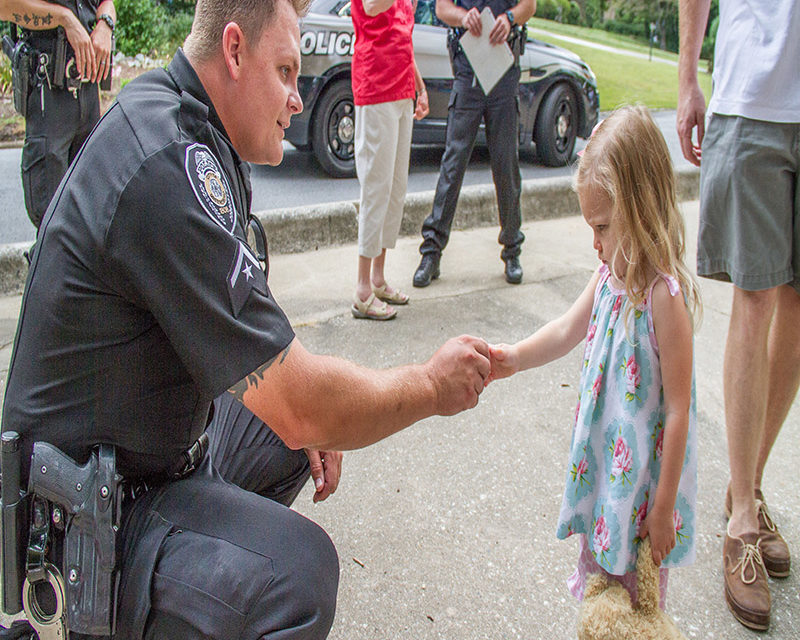The Greensboro City Council is working hard to find the best way to provide citizen oversight of the Greensboro Police Department; however, at a Tuesday, August 15 work session in the Plaza Level Conference Room of city hall, it became clear that there are still a lot more questions than answers when it comes to doing that.
Earlier this summer, the City Council voted to halt handing over any new cases to the Police Community Review Board (PCRB) – the oversight body that’s been addressing complaints about police actions. Several city councilmembers said at the work session that the existing PCRB process clearly wasn’t functioning well.
Some complaints were that the PCRB was taking a very long time to address complaints and, at the end of that extended process, the findings still often weren’t very informative for citizens. Both Police Department officials and citizens had expressed serious concerns about the way the PCRB was conducting its business prior to being put on ice by the City Council.
Even though there were many comments at the meeting about major problems with the PCRB, at the end of the work session the City Council voted unanimously to put that board back into action after Mayor Nancy Vaughan and others pointed out it would take a long time to get the planned new commission up and running. The consensus was that, until that happened, having the PCRB was better than nothing.
At the meeting, Greensboro City Manager Jim Westmoreland updated the council on the current situation and he summarized the committee’s findings.
“Suffice it to say that their assessment is that the current PCRB process is broken, probably beyond repair,” Westmoreland said.
At the work session, the councilmembers and city staff also heard from David Sevier, the chairman of the three-person committee addressing the situation and paving the way for a newly structured police oversight commission.
Sevier said the committee has been exploring the best process for establishing a Greensboro criminal justice advisory commission that the city may create to take over the job of the PCBR. That commission could be set up along guidelines from the National Association for Civilian Oversight of Law Enforcement, an organization that Sevier said had done some impressive work.
Sevier said about 200 complaint cases were brought to the City of Greensboro every year, while only six were referred to the PCRB.
“We would be looking at 200 or more complaints,” he said, adding that the process needs to be accelerated.
“One of the problems has been that this takes an ungodly amount of time,” he said of the current PCRB review process.
He added that the city is sending representatives to the national civilian oversight conference in mid-September.
Westmoreland said the City Council would have an Oct. 17 work session on the matter and he planned for staff to have something for the council to vote on at the council’s Nov. 21 meeting.
Police oversight often involves personnel issues so it’s expected that some action will be needed from state legislators for the new body in Greensboro to have all of the access it needs to confidential personnel materials.
The process is therefore going to be a long one, so there was concern about what would happen to complaints in the meantime – which is why the council voted to put the PCRB back in business for the time being.
Westmoreland said that, currently, even without the PCRB, there are channels for complaints. For instance, he said, some come to his office.
“There are multiple ways for people to give us complaints,” Westmoreland said.
Greensboro City Attorney Tom Carruthers said the PCRB appeals procedure is a “tightly scripted process through enabling legislation that doesn’t give us a lot of leeway.”
Carruthers also pointed out that citizens have an opportunity to review police body-cam videos if they are in those videos. He said people are taking advantage of that ability and said it’s happening “10 or 20 times a week.”
The city attorney added that this new police oversight entity should be set up with care because there had been “disappointment and frustration with body-worn cameras,” and there had been similar concerns with the PCRB since, he said, before those two things went into effect, people didn’t understand the legal limits of those methods of oversight.
Carruthers, who will be attending the conference in Spokane, Washington, said there were a lot of details to be worked out and that the city is “early in the process.”
“We are still on a learning curve,” Carruthers said. “It’s going to take some time for us to understand the best practices in the nation.”
Councilmember Sharon Hightower asked, “Could we restart PCRB in the interim?”
Vaughan said she thought that was a good idea.
“That timeline is getting pretty far out there and, in the meantime, we have suspended the PCRB,” Vaughan said. “The actual implementation is probably many months away.”
Vaughan said fears in the community had been expressed that people with complaints would “fall into a black hole of nothingness” if there was no review process in place.
Westmoreland said that, in the meantime, he will give the council monthly updates to keep them informed about the types of complaints being made about the Police Department.
Councilmember Yvonne Johnson thanked Sevier and the committee for its work, which will continue in the coming months.
“There has been a lot of work done and no one got paid a dime,” Johnson said.

